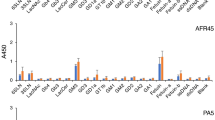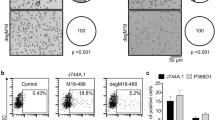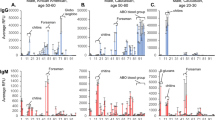Abstract
The mechanisms by which the adaptive immune system of animals discriminate between foreign and self components are not known. It is generally believed that antibodies are produced only in response to foreign agents. However, against this axiom there is mounting evidence that normal animals produce autoantibodies against a variety of self components1–6. In two murine model systems, a high proportion of IgM-producing cells secrete autoantibodies. In one model, the autoantibodies are specific for isologous mouse IgG(Fc)5 and in the other, the autoantibodies are specific for antigens revealed on the surface of mouse erythrocytes (RBC) by proteolytic enzymes6. The function of these two autoimmune responses is a mystery. Here we show that the two responses are related. The lysis of mouse RBC, modified with bromelain (brom), by IgM autoantibodies was completely inhibited by isologous IgG(Fc), and antibodies against mouse IgG(Fc) formed precipitin bands with solubilized membranes from mouse RBC. We conclude that mouse RBC membranes and IgG(Fc) have at least one antigenic determinant in common and that this determinant is the target for autoimmune responses in normal mice.
This is a preview of subscription content, access via your institution
Access options
Subscribe to this journal
Receive 51 print issues and online access
$199.00 per year
only $3.90 per issue
Buy this article
- Purchase on Springer Link
- Instant access to full article PDF
Prices may be subject to local taxes which are calculated during checkout
Similar content being viewed by others
References
Talal, N. (ed.) Autoimmunity (Academic, New York, 1977).
Arend, P. & Nijssen, J. Nature 269, 255–277 (1977).
Cunningham, A. J. Transplantn Rev. 31, 23 (1976).
Dresser, D. W. & Popham, A. M. Nature 264, 552–554 (1976).
Dresser, D. W. Nature 274, 480–483 (1978).
Steele, E. J. & Cunningham, A. J. Nature 274, 483–484 (1978).
Cunningham, A. J. & Szenberg, A. Immunology 14, 599–600 (1968).
Cox, K. O., Baddams, H. & Evans, A. Aust. J. exp. Biol. Med. Sci. 55, 27–37 (1977).
Möller, G. Transplantn Rev. 23, 126–137 (1975).
Izui, S., Eisenberg, R. A. & Dixon, F. J. J. Immunol. 122, 2096–2102 (1979).
Cunliffe, D. A. & Cox, K. O. Molec. Immunol. 16, 427–433 (1979).
Cox, K. O., Evans, D. A., Brooks, D. & Cunliffe, D. A. Immunology 38, 355–365 (1979).
Möller, E., Ström, H. & Al-Balaghi, S. Scand. J. Immunol. (in the press).
Ey, P. L., Prowse, S. J. & Jenkin, C. R., Immunochemistry 15, 429–436 (1978).
Gorini, G., Medgyesi, G. A. & Doria, G. J. Immunology 103, 1132–1142 (1969).
Weeke, B. Scand. J. Immunol. 2, Suppl. 1, 1–35 (1973).
Author information
Authors and Affiliations
Rights and permissions
About this article
Cite this article
Cunliffe, D., Cox, K. IgM-autoantibodies against isologous erythrocytes also react with isologous IgG(Fc). Nature 286, 720–722 (1980). https://doi.org/10.1038/286720a0
Received:
Accepted:
Issue Date:
DOI: https://doi.org/10.1038/286720a0
This article is cited by
-
Multiple organ-reactivity of monoclonal autoantibodies to mouse erythrocytes
Experientia (1987)
-
Cross-reacting rheumatoid factors and lupus erythematosus (LE)-factors
Springer Seminars in Immunopathology (1981)
Comments
By submitting a comment you agree to abide by our Terms and Community Guidelines. If you find something abusive or that does not comply with our terms or guidelines please flag it as inappropriate.



